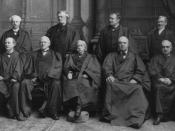Regents of the University of California v. Bakke
Allan Bakke, a white applicant to the University of California, was rejected twice in favor of minority applicants with significantly lower test scores. The University set aside 16% of the openings for minority students, while the remaining slots were available for everyone. In effect, minority candidates had 100 positions for which to compete, while white male candidates had just 84. (Brunner, p. 1) Allan Bakke sued the University in 1974. The case came to be called "Regents of the University of California v. Bakke". The case traveled through the California courts, and then to the United States Supreme Court October 12th, 1977.
The Supreme court ruled 5 to 4 in favor of Bakke, striking down the University of California's "set asides," (the positions reserved for minorities) as unconstitutional. (Brunner, P. 1) The court based its decision on the 14th amendment, which forbids the government depriving any citizen of equality in law and due process.
(Forester) As a result of the decision, Bakke was admitted into the University and graduated in 1992.
This decision put an end to racial quotas in admissions at public Universities. However, the Court did now say that public institutions could disregard race and ethnicity completely. (Brunner, P. 2) It said that race could be considered if economic disadvantage was considered as well, along with other factors. This case paved the way for some affirmative action, while leaving room for improvement.
The majority opinion explained that trying to achieve a diverse student body is "sufficiently compelling to justify consideration of race in admissions decisions under some circumstances, petitioner's special admissions program, which forecloses consideration to persons like respondent, is unnecessary to the achievement of this compelling goal and therefore invalid under the Equal Protection Clause". (Justice Powell)...


